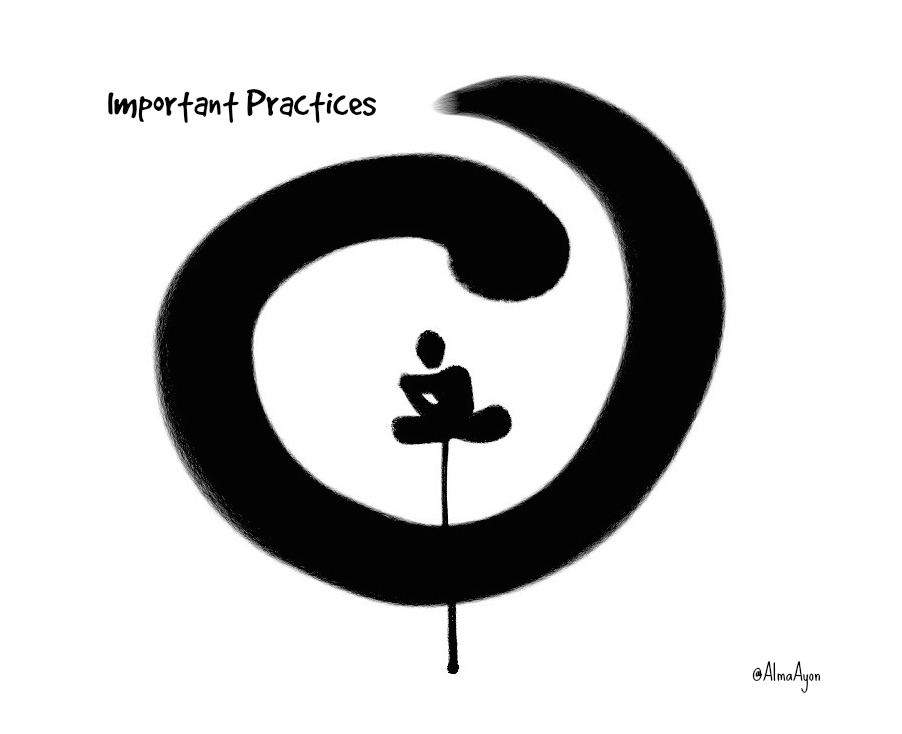by Alma Ayon | Aug 22, 2017 | meditations
Contemplative practices can be summarized in the "Three Trainings":
1. Ethics: We cultivate Loving Kindness and Compassion to benefit those around us and we try to avoid damaging people, animals and the environment. Developing generosity, patience, discipline, empathy and enthusiasm are other important ways to cultivate Genuine Happiness, this is a happiness that relies on a balanced mind and not on external stimuli.
2. Concentration: Developing an attentive mind, present, able to focus without distraction, but relaxed and without inner dialogue. To be able to focus on positive thoughts and emotions and turn our attention away from negative thoughts and ideas.
3. Wisdom: Analyzing the reality of how we exist ourselves and everything around us. Accepting that everything is impermanent, interdependent and that everything lacks a concrete identity.
Within these three trainings we have many meditations that can help us transform our lives and relationships and live a more meaningful life.
by Alma Ayon | Aug 20, 2017 | attention, meditations
Remember what you did last Monday. Do you remember what you ate? The clothes you wore, the people you met, the things you said?
Does it take a little work to remember? Perhaps it is because we constantly receive so much information and when we want to concentrate on what happens in the present there are so many distractions!
Our attention jumps from side to side, trying to multi-function on various tasks. When we decide to focus on a thing we can stay focused 3 to 10 seconds, before our mind begins to distract ourselves with thoughts, after 10 minutes of performing an activity, there is something that interrupts the flow of our attention and distracts us.
There are two practices in which we want to train our mind, the first is mental presence, through which we have an open attention to all the senses, aware of everything that is happening at the moment, without focusing on one thing in particular, but without leaving unnoticed something that is happening in the present.
The second practice is focused attention, we choose to focus and concentrate on something that is happening or we are doing in the present. We leave everything else in the periphery of our attention and as we concentrate more, we enter the state of flux where we no longer notice anything other than our object of attention. We lose track of time and what surrounds us. When we are so concentrated, joy arises and we enjoy what we are doing. But many times when we concentrate we become tense, so it is important to be aware of our body and mind and learn to relax them.
Both practices require mindfulness which is the ability to pay attention but also to remember to bring our attention back to the object.
The first thing to do is to recognize what it is important for us, and to give our attention to it, we need stop wasting our time by attending to thoughts and fantasies that have no relevance to our goals, and to focus here and now on what is truly important.
As we train more and more our attention, we become more efficient and we are able to make progress in what is important, so it is important to strengthen our attention through constant practice.
I recommend the following articles to continue learning about the training of this wonderful faculty of care:
Transform your mind
How to focus on your goals
***
Share your experience with these practices in the comments section below!
by Alma Ayon | Oct 9, 2016 | meditations, videos
Our mind is like a waterfall, if we learn to relax in the present we can see it more clearly. That's meditation.
by Alma Ayon | Jul 17, 2016 | wisdom
The fundamental nature of the human being is goodness, you and I and almost everyone knows it, but some people have many veils of ignorance that hide their true nature, it's ignorance that makes them feel alienated, locked in a body, fending others and the world, they do not realize that by harming others they harm themselves.
When we recognize our fundamental nature, we eliminate ignorance and ego-clinging. And we recognize that our happiness is tied to that of others.
All this sounds great, and we know it in theory, but how can we start and really transform ourselves? It's not enough to recognize that we have a big ego and that we are dominated by our mental afflictions, we already know, every time we blame, criticize or justify ourselves or others, we know that the ego is in action.
The best way to begin a real transformation is to start watching our minds. Carefully. Unfollow thoughts and bring our attention again and again to the present, to our senses, what we are doing, what we are seeing, feeling, hearing, etc. This is, to start living with full awareness. To see our emotions arise and decide how to react wisely. Cultivating concentration to focus on what it is worthy, cultivating a good heart to help those around us and develop our wisdom.
This process does not happen overnight, nor praying, nor reading books or discussing our views. The only way is to practice, and how do we practice? we begin by having a dedicated space for our inner practice, with proper posture, and devote 5, 10 or 20 minutes every morning to train our mind. During the day apply everything you practiced in your relationships with other beings and with the world. Click here to learn how to make the first practice. Gradually ego-clinging will decrease and your fundamental nature will emerge.
by Alma Ayon | Feb 15, 2016 | emotions, meditations
When you feel rejected, assaulted, alone, depressed, angry; you are creating separation from the world, you disagree with it, you are judging it. The best thing to do is accept this moment and be fully aware of the emotion you're experiencing, without rejecting it, but without feeding it with more thoughts, watching the thoughts that arise involuntarily and let them pass, stay present and rest on the awareness of being aware, of being alive, of being experiencing. Let your mind be as motionless sky and let your thoughts and emotions arise and pass like clouds. Do not fight, do not reject the experience, do not act. Stand still watching your mind, go for a walk alone and coordinate your steps with your breath while you attend to emotions and sensations in your body.
Do not analyze the triggers of your emotion until it has diminished or gone altogether.

